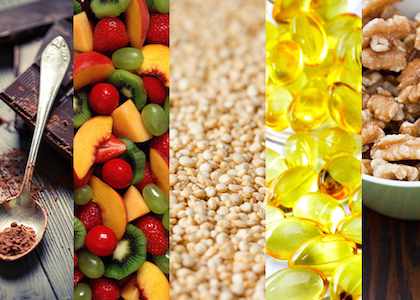
Top 5 Foods to Help Fight Depression
By Stacy Kennedy, MPH, RD, CSO, LDN; Reboot Nutritionist
Depression is one of the most common health conditions affecting 1 out of every 10 Americans each year. In fact, within our Reboot community, depression and other mental health issues rank second behind overweight and obesity as the reason for joining the community or being interested in juicing.
Working with a wellness-focused mental health practitioner is essential for helping to feel better and improve overall wellness in your everyday life. In addition to working with an expert, consuming healthy foods can make a big difference in how you feel.
Here are the top 5 foods to help fight depression:
1.) Chocolate
So many of us LOVE chocolate! Besides great taste and loads of health promoting antioxidants (in the dark, cacao rich varieties – not the processed milk chocolate stuff, of course), chocolate is one of the best mood-boosting foods. Chocolate is metabolized by the body into serotonin, one of our most potent mood enhancing hormones. No wonder we love it is so much! Just remember that if you’re trying to lose weight, a little bit goes a long way.
Check out some of these delicious chocolate recipes:
Double Chocolate Smoothie
Cacao Berry Smoothie
Chocolate Almond Butter Milkshake
“Cream” Filled Chocolate Cookies
2.) Fruits (for natural sweetness!)
Fresh fruit is bright, vibrant and packed with immune supportive, health promoting phytonutrients. Unlike natural sugars in fruit, which are coupled with numerous phytonutrients and fiber to help regulate absorption, processed, refined sugars can cause a big boost in energy followed by a massive crash. This up and down is kind of like driving your car by flooring the gas then slamming on the breaks, over and over again. This sort of stop-and-go system can really zap energy levels and lead to feeling blue. Rather than a traditional sugary treat in the afternoon, try a piece of fresh fruit. Even better, add a plant-based protein to your fruit for even more blood sugar stabilizing power, like a handful of raw nuts with a fresh apple, banana, pear or orange. Blend up or juice your veggies along with your fruits for more balance, like our 80/20 Golden Reboot Rule.
Check out these super fruity and healthy recipes:
Cucumber Melon Smoothie
Raz Avocado Smoothie
Summer Fruit Bake
Berry Breakfast Quinoa
3.) Gluten-free Grains
Going gluten-free is a hot food trend and while it’s not necessary or right for everyone, gluten sensitivity or intolerance has been linked to behavioral issues. Our youngest son was exhibiting signs of aggression and what my husband, health and wellness psychologist, Dr. Russell Kennedy, called “wheat rage.” Almost a year ago our family went on a gluten-free adventure to help Dillon and what a difference! In just a few weeks we noticed a big change in his behavior. As a 3 years old he of course pushed boundaries, but when he got upset he was much less intense and the time it took for him to calm down was so fast compared to before we eliminated gluten. Dillon, who suffers from other food allergies or sensitivities, used to say he had a “monster in his belly;” truly heartbreaking for a parent to hear. After going gluten-free he told me, “Mommy, the monsters are gone!”
Check out these gluten-free flavorful recipes:
Fresh Veggie Enchiladas
Lentil and Quinoa Stuffed Acorn Squash
Sweet Lime Quinoa Pasta Salad
Spiced Quinoa Lentil Loaf
4.) Vitamin D
Lack of vitamin D has been linked to many health issues from increased cancer risk to mood disorders. In fact, seasonal affective disorder or SAD might be linked not just to reduced exposure to direct sunlight in winter months but specifically how this leads to a lack of vitamin D. Most of us can’t get enough vitamin D from our diet or from sitting out in the sun for 15 minutes without the sunscreen most of the year – you have to live above the 37th parallel – that’s north of Atlanta, Georgia! This means you may need to take a supplement. Ask your doctor to check your blood level of vitamin D to find out if you could benefit from taking supplements.
5.) Omega-3 Fats
Foods like walnuts, chia seeds, flax seeds and wild salmon are rich in essential omega-3 fatty acids. Besides helping to reduce inflammation, these important nutrients are also linked to helping risk of depression.
Check out these Omega-3 rich recipes:
Hail to Kale Salad
Cha-Cha-Chia Berry Smoothie
Nut Berry Breakfast Quinoa
Granola Smart Hearts